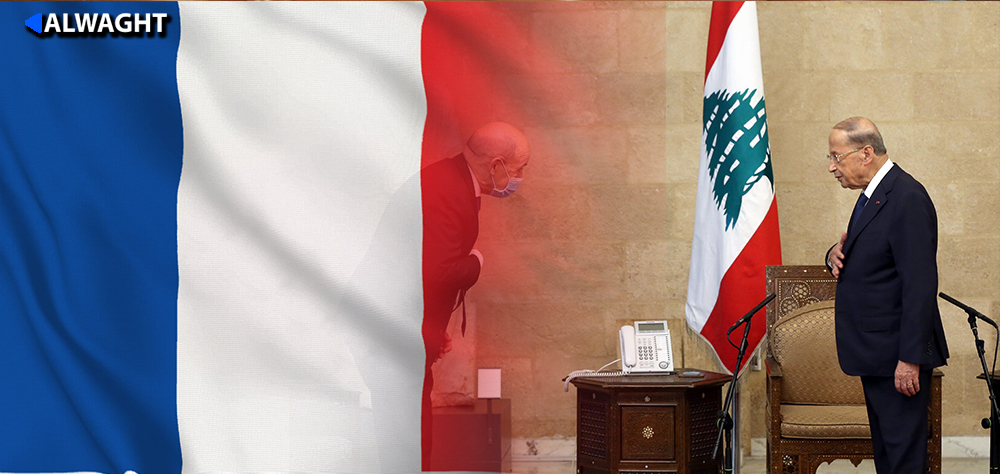Alwaght- The French Minister for Europe and Foreign Affairs Jean-Yves Le Drian visited Beirut yesterday to meet the Lebanese officials and discuss ways to remove the obstacles ahead of new government formation in the crisis-hit country. The trip came as Paris, taking the role of a godfather in Lebanon, has warned the Lebanese politicians that it would punish with sanctions those putting the skids under formation of a new government headed by Saad Hariri.
Over the past 9 months, Lebanon has been grappling with a crisis caused by a failure to form a new cabinet. Now the question is if Le Drian's visit can end the political impasse choking the country.
Lebanese players influenced by foreign actors
Certainly, two factors stand as obstacles ahead of government formation and cause ongoing political crisis: Foreign actors and the internal players swayed by them. Once called the "bride of Middle East" and one of the region's most stable countries, Lebanon is now crisis-weary as it is a scene for multiple foreign actors' interference.
In the current situation, in tracing the cause of Saad Hariri's failure to form a cabinet, it must be said that Hariri's policy, not the political problems, is the driving force behind the crisis. In his political approach, there is no place for a look to inside. This approach over the past month took him to Qatar and the UAE. The Emiratis seem to have proposed to him to quit Beirut for life in Abu Dhabi. Reports suggest Abu Dhabi Crown Prince Mohammed bin Zayed has called on the Lebanese PM-designate to leave the Saudis for alliance with the Emiratis.
Actually, today's crisis is an outcome of a failure by the March 14 Alliance to look at the internal potentials. The March 14 Alliance led by Hariri has repeatedly rejected President Michel Aoun's proposals seeking exit from the crisis because of its dependence on Saudi Arabia. The rival March 8 Alliance supports the resistance circle in the country represented by Hezbollah, and Saudi Arabia strongly opposes the presence of Hezbollah and its allies in the Lebanese cabinet. As long as Hariri takes such an approach, the government crisis in Lebanon will not end. Meanwhile, the influence of Western governments such as France and the US is undeniable, but it is the political policy of Hariri that has brought Lebanon to a political impasse. The only way out of the political abyss for the Lebanese is to change the direction of Hariri in favor of trusting the internal potentials.
The fact is that as the current situation continues, "life in Lebanon grows impossible." Lebanon does not need foreign mediation to get out of the current crisis. It requires all groups to sit around a table and talk about the future of this beautiful country whose per capita income in the 1960s was among the world's top 10 countries.
The US sanctions against Lebanon
In the present conditions, if the French government truly seeks to settle the Lebanese crisis, it first needs to talk to the US to lift the sanctions on Beirut. Over the past two years, Washington imposed huge sanctions on the Lebanese political and economic figures and entities in a bid to prevent Hezbollah influence and power in the government.
In the most significant step, the US government imposed sanctions on the Lebanese central bank last fall to further push to the wall the country's fragile economy. Washington's sanctions meant isolating Lebanon from the global financial system. In September last year, Trump administration sanctioned Lebanon Minister of Transportation Yousef Fenianos and Finance Minister Ali Hassan Khalil for what it called "corruption" and assisting Hezbollah financially. In November, Trump sanctioned Gibran Bassil, the head of Lebanon's biggest Christian bloc and former foreign minister. Certainly, these sanctions against Beirut, which now extend beyond the personalities and factions present in Hezbollah, have become an important factor in the failure to form a government.
The French leaders are aware of the sanctions' key role in obstruction of a new government. President Emmanuel Macron of France on November 20 called on the time's US Secretary of State Mike Pompeo to delay further sanctions to make way for new cabinet. As long as the American sanctions are in place, a new Lebanese government formation will remain an uncertainty.
Settling economic crisis a prerequisite to solve political crisis
The political crisis in Lebanon is not solvable with just political slogans and foreign trips. An important prerequisite for solving the political crisis is settlement of the economic predicament. Lebanon's economic situation has deteriorated and become more critical than ever in recent years due to the political tensions, US sanctions, and coronavirus outbreak.
The country is experiencing its worst financial crisis since its independence in 1943. The high unemployment rate, 40 percent, and highest debt-to-GDP ratio, $85 billion according to the World Bank, officially make the governance a play with fire. The debt-to-GDP ratio is expected to grow to around 185 percent by 2024.
Additionally, the Lebanese currency, pound, lost over half of its value against the US dollar, and the over 30 percent inflation really puts the Lebanese in dire straits. Even more importantly, the Lebanese economy, whose main sectors are the banking and tourism and is mainly service-based, is largely dependent on the Syrian economy which is in place hit by the US-imposed Caesar sanctions literally targeting dealing with Damascus of any person or government or organization.
All these facts show that one way through which Lebanon can settle its political crisis is economic improvement. If France says it is serious in its efforts to help Lebanon, then tying the economic aids to Beirut to a new government formation speaks against its intention.



























